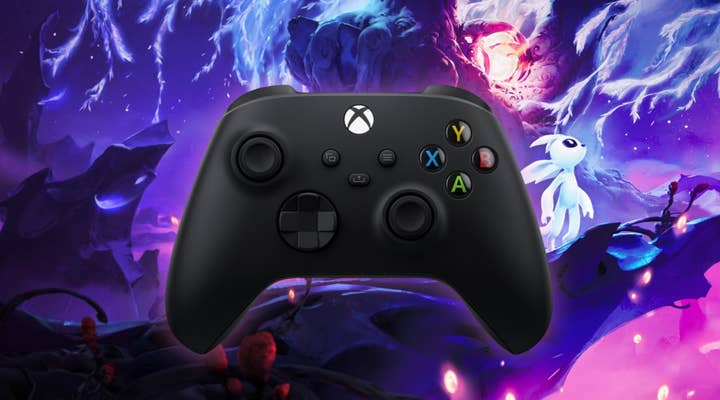How Xbox is still changing the games industry
VP Sarah Bond talks about the brand's efforts to transform and expand the games business
I've never really seen Xbox as a nostalgic company.
PlayStation, from time-to-time, absolutely. And Nintendo almost constantly. But Xbox? It is pro-active in preserving its history, but it's never been one to revel in it. In all my years writing about Microsoft's games business, the conversation has always been about the next big disruptive idea, whether that's Xbox Live or Kinect or Game Pass or Cloud Streaming. I've rarely known Xbox to stand and stare.
So perhaps it was inevitable that our chat with Microsoft's Sarah Bond, which was set-up to discuss the 20th anniversary of Xbox, became mostly about what's to come, rather than what has been.
"We spend a lot of time making sure we've learned from our past," says Bond.
"A lot of what you see in terms of how we're pushing towards the future is because of the understanding we've gained over the last 20 years. That's a lot of where our player-centric and creator-centric approach has come from. It's not that we're looking back, but more building on where we've been.

"Game Pass came out of our deep commitment for players that we've built over the years. We've pioneered [online] multiplayer with Halo, and we realised how much people got out of playing together. And that is what got us thinking about cross-play, and building Game Pass to working across devices."
We did try to talk about the past. But even when discussing the things Xbox has brought to games over the decades, the conversation turned to recent examples such as cross-play and Game Pass. Even the classic games we spoke about -- Halo, Age of Empires and Flight Simulator -- are all games that have just received (or about to receive) new entries.
Microsoft does have plenty of historical achievements that have changed the console business; Online multiplayer subscription, internal hard-drives and achievements were all concepts pioneered by Xbox. Not everything worked out. The original pitch for Xbox One was ambitious but quickly dropped, Twitch-rival Mixer never found its audience, and Kinect, although popular initially, was eventually abandoned. And does anyone remember Smartglass?
Yet we all know success is built on failure. And Bond says that statement is just as true at Xbox as it is everywhere else.
"Kinect is a great example," she tells us. "We are never going to have true breakthrough innovation if everything works out. If everything works out, then you know you haven't been pushing to do a true breakthrough. It means you're playing it safe.
"We don't see Kinect with the Xbox today like we did. But a lot of the things we learned as a team, so the actual development of the technology, sticks with us. We did a lot of things around making it inclusive, and making sure it works for families... and that sticks with us to this day. And actually, that technology has been used in a number of enterprise applications.
"So it looks like we've dropped it, but what we did was evolve it to what the next thing it was going to be, and it left us with a lot of really great lessons around product development."
If there's one thing that might characterise Xbox's 20 years in games, it's the company's penchant for going all in. Whether it's spending huge sums acquiring Rare and Mojang and Bethesda, or investing in AR and motion tech, or the weight it puts behind services like Xbox Live and Game Pass. You rarely see Microsoft try anything tentatively.
"We were cognisant of the fact that it was unlikely that anybody else would do [Game Pass]"
"When we get an indication that we have an innovation, or idea, or product that really meets player needs, and really opens up opportunity for creators, we go all in," Bond acknowledges. "Because we feel a real responsibility there.
"Game Pass is a great example. We saw the research when we developed it. We released it. We saw the fan reaction and how they were engaging and how great it was for creators, and we were cognisant of the fact that it was unlikely that anybody else would do it. So, it was a sort-of responsibility for the industry to do it.
"And some of the other player-centric stuff. For a lot of platforms, they might say they don't want to do cross-play, or I don't want to do back compat. But we believe, if you put the player first, that's the best thing for the industry."
If there's one reputation that Xbox has always been eager to shake is the idea that it is the 'shooter box'. The console initially found a strong audience through adult games like Halo and Gears of War, and racing titles such as Project Gotham and Forza.
The reputation isn't entirely fair. Even in the early days of Xbox, games like Blinx and Viva Pinata spoke to a very different crowd. And since there's been Kinect, Minecraft, Ori and the Blind Forest and Psychonauts. But going broader remains a key ambition for Xbox. The company wants to speak to those three billion gamers, and that's going to require making its games more accessible, more affordable and more appealing to more people.
"Over the next ten years, gaming is going to become a more prevalent and mainstream media," Bond says.
"From a revenue perspective, gaming is already the largest. But in terms of engagement hours, or what people are talking about on social, or whether or not everybody is doing it... gaming is going to be huge in that way.
"We see that engagement is what really drives our growth, and when we lower the barriers to people being about to participate, engagement goes up. When we make it possible for people to play across all devices, when we make it possible to connect with your friends, when we introduce stories or character types or IPs that otherwise wouldn't have been discovered... all of those are inclusive moves, that aggregate more and more engagement.
"I asked a question recently on Twitter, I asked: 'How do you play on Cloud Gaming?'. I think I've got 100 answers, and it fascinates me. People were saying they [used it] so they could all play together in the same room with people using their phone, and some were saying their kids wanted to do this other thing, so they played via the cloud... or I do it while I watch TV. It is amazing how it took away a barrier that we didn't realise existed."
The idea behind game streaming, even from the early days of OnLive and Gaikai, was about making games more inclusive and accessible. Yet despite significant investment, it's still a long way from that vision. What is it going to take?
"Time, like all innovations," answers Bond. "Proliferation of high-speed connectivity is going to matter, but there is a lot of that. It is something that we will start to see become a greater and greater portion of the industry in the next five to ten years."
What is taking off at a faster rate is Game Pass. The service has tens of millions of customers, and it's resulting in significant engagement and player numbers - the new Forza Horizon 5 has just broken Xbox records, and you can guarantee Game Pass played a starring role in that.

Yet concerns still linger. What is the impact of this on the AAA games market? What with their $70 games now going head-to-head with an affordable subscription service packed with big new releases from Microsoft's expanding studio portfolio?
"I understand people are concerned, because I've heard it a lot," Bond admits. "I look at this every day. This is my job. What is the total economic impact? What does it mean? Every time we look at it, we see that it is really beneficial for all games, inclusive of AAA. We see that engagement goes up, we see that spending goes up. I think I've said those stats a million times. And frankly, people wouldn't be bringing us better and better games and launching them in Game Pass, if it weren't economic for them. There is a logic to it.
"Do I think subscriptions are going to be the dominant model? I actually think we are going to see a diversity of business models. Even our Game Pass subscription is a combination of subscription and transaction. You have this subscription, you get access to the game, there's in-game transactions, but also you get a discount on the purchases, and if the game leaves Game Pass, you can choose to buy it. I see [Game Pass] as a product that has subscription in it, but includes other transactional business models. I think that is going to continue.
"And you'll see new business models, like advertising, like... people are talking a lot about NFTs as an alternative way to monetise.
"What I'd like to see in ten years is that we have made it possible for someone to become a known creator, from just being a citizen"
"All of that enables more forms of creativity. When you have one dominant model, you see that impacts the nature of the gameplay. If you look at a free-to-play game, there's certain mechanics associated with the nature of those games, they might be more dependent on in-game items, which changes the story because of it. So we will have all of these models, because they enable different types of game creation. Which is what people want. People don't want all one thing or the other. There is a difference between The Batchelor and The Crown, if that makes sense."
Bond continues: "When we started [with Game Pass], we studied what happened in video and music. And we found that both models still existed. One didn't take over the other. I think they settled to like 60/40. It was different to before, but you had both business models living together."
So there we are, in a conversation about Xbox's past, we couldn't get away from its future. Microsoft is on a mission to change how games are bought, made and distributed, is there really time to reminisce about how great Fable 2 was? (That wasn't a great example, there's always time for that).
One last question we had for Bond was around what she hopes we'll be looking back on come Xbox's 30th anniversary. And one of the answers stems from the company's recent efforts to make game development more accessible, which included putting up the majority of its game developer toolkit on Github for anyone to access.
"I hope for two things [for the 30th anniversary]," concludes Bond.
"For players, I hope that the innovation that we are driving around cloud and local converges to unlock new states of play. So you can actually move across a whole set of devices in different states of connectivity, and your play will seamlessly adapt to that. For now we are in lift and shift mode, the dynamism doesn't exist. But I hope it will be dynamic and open up new player experiences that we don't know about yet.
"The second thing, is that if you look at video and music, the creator side of things has been democratised. You can have a Justin Bieber exist, where someone can shoot a video and become famous, or start their career from that angle. That doesn't exist as much in games, because it is much harder to make games.
"What I'd like to see in ten years is that we have pioneered to make it possible for someone to become a known creator, from just being a citizen. Just as you've seen in music and video. It makes sense that games have gone last, but I think that it will happen, and I want Microsoft to be the group that does it."

